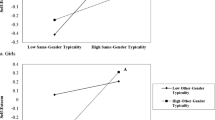Abstract
In three studies, the relationship of children's height to both (a) adults' attributions regarding the children and (b) preschoolers' social and cognitive competencies were examined. Sex differences were consistent with stereotypic conceptions. In the first two studies, mothers of preschool children rated photographs of toddlers varying in height on a variety of social and cognitive abilities. The mothers also assigned punishment to the children for hypothetical transgressions. In Experiment 1, mothers rated the large boys as more competent than the average-sized and small boys (even when effects of mothers' perceptions of the children's ages were covaried). In Experiment 2, involving female stimuli, mothers rated small girls as being less able (especially less independent) than average-sized or tall girls. While the effect of height on mothers' attributions was still evident when the effects of perceived age of the children were covaried, the pattern of results was less clear. Mothers assigned more punishment to tall girls (but not tall boys) than to small girls regardless of perceptions of age. In Experiment 3, height was associated with boys', but not girls', competence on tasks of logical ability and boys' sociometric nominations of whom they prefer to play with (significant for girls, marginally significant for boys). Height was not highly correlated with peers' perceptions of competence. The implications of the research for the socialization process are discussed.
Similar content being viewed by others
References
Asher, S., Singleton, L., Tinsely, B., & Hymel, S. A reliable sociometric measure for preschool children. Developmental Psychology, 1979, 15, 443–444.
Barker, R. G., Wright, B. A., & Gonick, M. R. Adjustment to physical handicap and illness: A survey of the social psychology of physique and disability. New York: Social Science Research Council, 1946.
Bayley, N. Individual patterns of development. Child Development, 1956, 27, 45–74.
Connor, V. M., & Serbin, L. A. Behaviorally based masculine and feminine-activity preference scales for preschoolers: Correlates with other classroom behaviors and cognitive tests. Child Development, 1977, 48, 1411–1416.
Dannenmaier, W. D., & Thurmin, F. J. Authority status as a factor in perceptual distortion of size. Journal of Social Psychology, 1964, 63, 361–365.
Gowin, E. B. The executive and his control of men. New York: Macmillan, 1972.
Jerrison, J. J. Evolution of brain and intelligence. New York: Academic Press, 1973.
Meyerson, L. Somatopsychology of physical disability. In W. Cruickshank (Ed.), Psychology of exceptional children. Englewood Cliffs, N.J.: Prentice-Hall, 1963.
Prieto, A. G. Junior high school students' height and its relationship to academic and social performance (Doctoral dissertation, University of Missouri, Columbia, 1974). Dissertation Abstracts International, 1975, 36, 222A (University Microfilms No. 75-10, 638).
Wilson, P. R. Perceptual distortion of height as a function of ascribed academic status. Journal of Social Psychology, 1968, 74, 97–102.
Wylie, R. C. The self-concept: A critical survey of pertinent research literature. Lincoln: University of Nebraska Press, 1961.
Author information
Authors and Affiliations
Additional information
The authors wish to express their gratitude to the parents, teachers, and children at the Child Study Laboratory, Students' Child Center, Palo Alto Preschools, and Tempe Preschool. The authors would also like to thank Michael Gunzelman, Michelle White, Julie Mankowski, Marsha Kaplan, and Melissa Rook for their able assistance in data collection.
Rights and permissions
About this article
Cite this article
Eisenberg, N., Roth, K., Bryniarski, K.A. et al. Sex differences in the relationship of height to children's actual and attributed social and cognitive competencies. Sex Roles 11, 719–734 (1984). https://doi.org/10.1007/BF00288123
Issue Date:
DOI: https://doi.org/10.1007/BF00288123




